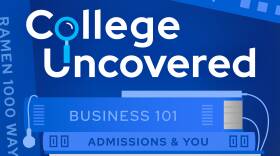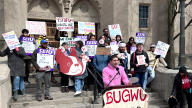Amid uncertainty, some colleges brace for more cuts
Even selective colleges like Yale say they have to trim their budgets.
Podcast: College Uncovered
-
[BONUS] The New College Compact
Across the country, public universities are being flooded with requests for syllabi, reading lists, course materials, and data on international students. One company is behind many of those requests - Metric Media. Part of a growing network of conservative-led groups, Metric Media says it’s enforcing civil rights laws and holding taxpayer-funded institutions accountable. But critics see something very different: a coordinated pressure campaign emboldened by the second Trump administration that threatens academic freedom and seeks to intimidate scholars. Now some universities are pushing back.In this bonus episode of College Uncovered, GBH’s Kirk Carapezza talks with Brian Timpone, CEO and founder of Metric Media. In a rare interview, Timpone says there’s great public interest in what public universities are teaching students and he thinks America’s public colleges have lost sight of their mission.“Some of the names of these courses, they’re almost like The Onion,” Timpone says.Dan Kennedy, a Northeastern University journalism professor, argues that groups like Metric Media are weaponizing public records laws to pressure and silence professors. We also hear from two faculty members who’ve been targeted: Christopher Petsko, a business professor at the University of North Carolina, and Jennifer Ho, a professor of Ethnic Studies at the University of Colorado–Boulder.And as the Trump administration threatens to withhold federal research funding unless universities sign its proposed “Compact for Academic Excellence in Higher Education,” some schools have already declined.Ted Mitchell, president of the American Council on Education, tells us why he believes the compact would be disastrous for colleges and the country and why you should care.“This is nothing short of a government attempt to make institutions creatures of the state,” Mitchell said. “That’s so antithetical to what higher education is and does. Higher education is about inquiry-based research, discovery-based teaching, and to deprive institutions of the ability to do that is really tantamount to just making them propaganda engines.”The New College Compact explores the escalating battle over academic freedom, political pressure, and the future of higher education in America.Additional links: Local colleges targeted amid growing campus culture warsZombies, Garbage And Vampires? It's Not A Nightmare, It's Your College Course CatalogUn-Welcome to CollegeDEI Backlash“College Uncovered” is made possible by Lumina Foundation.----------Credits:Host and Producer: Kirk Carapezza Editors: Azita Ghahramani and Jenifer McKimExecutive Producer: Lee Hill Mixing and Sound Design: David Goodman & Gary MottTheme Song and original music: Left-RomanArtwork: Matt Welch Project Manager: Meiqian HeConsulting Producer and Head of GBH Podcasts: Devin Maverick Robins"College Uncovered" is a production of GBH News -
Science In Reverse
The government rescinded billions in federal research grants during Trump’s first few months in office — cutting fellowships, scholarships, and postdoc programs that support the next generation of scientists.A federal judge recently ordered the restoration of some National Institutes of Health grants. A battle over National Science Foundation funding is still playing out in court.So what do these cuts actually mean for higher education and scientific discovery? And if the United States gives up its global lead in innovation and research, what does that mean for the rest of us?In this episode of College Uncovered, host Kirk Carapezza and reporter Craig LeMoult visit one public university hit especially hard — and explore what’s really at stake for American science.“College Uncovered” is made possible by Lumina Foundation.----------Credits:Host and Producer: Kirk Carapezza Editor: Jenifer McKimExecutive Producer: Lee Hill Mixing and Sound Design: David Goodman & Gary MottTheme Song and original music: Left-RomanArtwork: Matt Welch Project Manager: Meiqian HeConsulting Producer and Head of GBH Podcasts: Devin Maverick Robins"College Uncovered" is a production of GBH News and The Hechinger Report. -
Why Do Colleges Rarely Revoke Tenure?
Harvard just did something it hasn’t done in decades — it fired a tenured professor.Francesca Gino built her reputation studying honesty. Then she was accused of faking data. In May, Harvard’s top governing board revoked her tenure and ousted her from the Business School.But why is stripping tenure so rare — not just at Harvard, but anywhere? How common is research fraud? And why are colleges so secretive when it happens?College Uncovered’s Kirk Carapezza and reporter Mark Herz unpack the Gino case. Then Kirk sits down with science journalist and attorney Eugenie Reich, author of Plastic Fantastic: How the Biggest Fraud in Physics Shook the Scientific World.“College Uncovered” is made possible by Lumina Foundation.----------Credits:Hosts: Kirk Carapezza & Jon MarcusEditor: Jenifer McKimExecutive Producer: Lee Hill Mixing and Sound Design: David Goodman & Gary MottTheme Song and original music: Left-RomanArtwork: Matt Welch Project Manager: Meiqian HeConsulting Producer and Head of GBH Podcasts: Devin Maverick Robins"College Uncovered" is a production of GBH News and The Hechinger Report. -
S4 Eps 8 Apprentices of the World, Unite!
Is the four-year college degree losing its grip on the American Dream? Just as American colleges reach the demographic cliff in 2026, higher education in the U.S. is facing mounting pressure from all sides. President Donald Trump has targeted several highly-selective, wealthy universities, slashing federal research funding and questioning their tax-exempt status – painting them as overpriced and out-of-touch bastions of liberalism. But skepticism about college isn’t just coming from the right. On the campaign trail, Democratic nominee Kamala Harris called out the country’s narrow focus on four-year degrees, urging more support for apprenticeships and technical programs. And the public seems to agree. A growing number of Americans – nearly a third – now say they have little or no confidence in college. That’s up 10 percent from a decade ago. Employers and states desperate for talent are dropping degree requirements for certain entry-level positions. So where does that leave students and families? And how are colleges, especially those struggling to fill seats, adapting? In this episode of College Uncovered, co-hosts Kirk Carapezza and Jon Marcus dig into the rise of alternative pathways. They explain why there aren’t more apprenticeship and internship opportunities and explore what happens when the college degree is no longer the default. Whether you’re a student, parent, or just interested in the future of higher education, this episode helps explain what comes next. -
S4 Eps 7 Cyber School
Here’s a milestone you might not have heard about: It’s projected that this year, for the first time, more college students will take all of their courses online than will take all of their courses in person.Online higher education has come a long way since its predecessor, the correspondence school. The universal shift to remote learning during the pandemic only accelerated that momentum. It has also allowed more comprehensive research into whether online teaching works as well as the in-person kind.But even as more students go online to learn, there are many caveats about this fast-growing innovation. We talk to the experts about who should take online courses, where they should take them and in what subjects. We also lay out questions to ask of online providers, such as what kinds of real-world supports — faculty office hours, tutors — are available.Finally we solve a mystery that frustrates countless consumers: how in the world it’s possible that most online courses cost as much as, or more than, the brick-and-mortar kind. After all, technology has lowered prices in almost every industry. Come with us as we expose the reason higher education can find a way to charge more for yet another product that by all rights should cost less.













